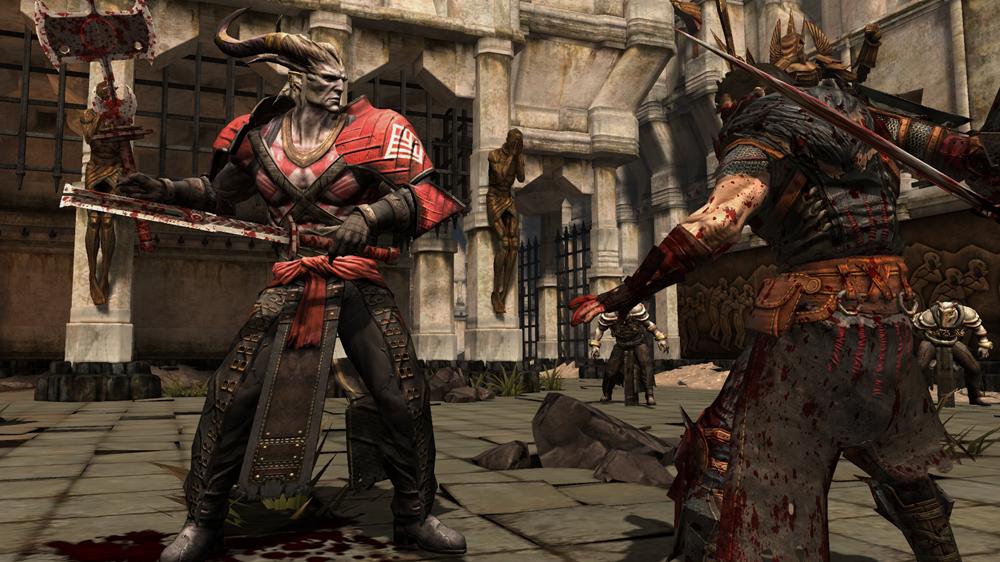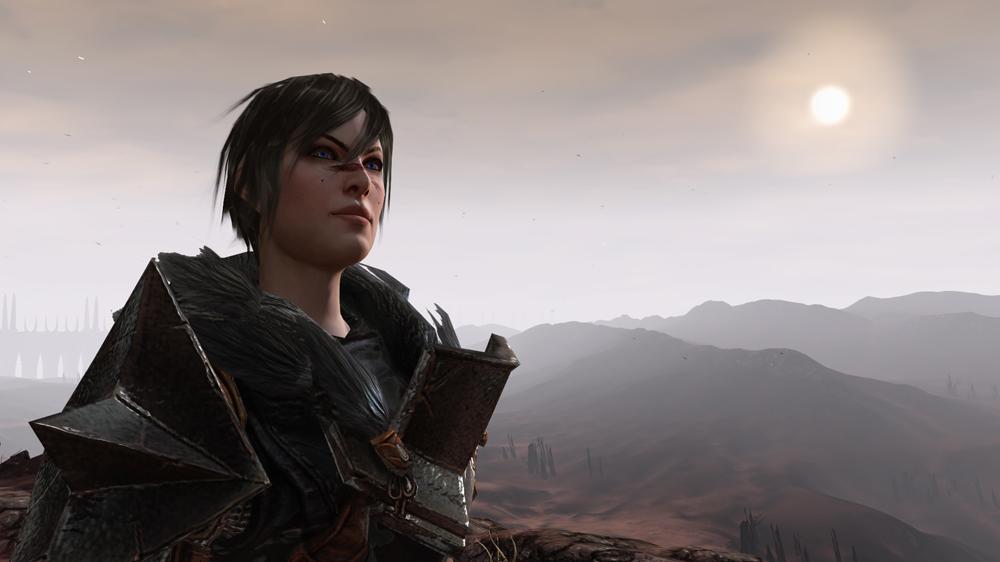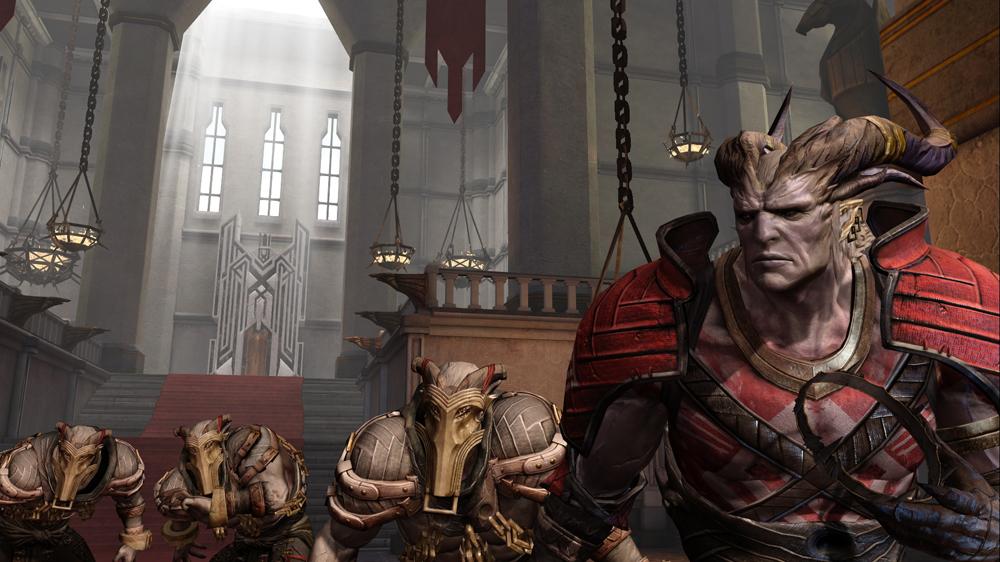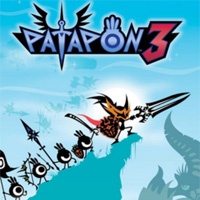
A lot of people loved Dragon Age: Origins. Me? I…..well, I liked it. Don’t get me wrong, I wanted to love it (I so wanted to love it) but, as was the case when playing the similarly epic Oblivion and Fallout 3, I just couldn’t shift the feeling that the whole experience had been stretched a little too thinly and that while the amount of content could never be brought into question, the overall quality certainly could.
I know a lot of people will disagree with me, but it’s the little things that often bug me the most in games of this ilk; poor animations, expressionless characters and unnecessary padding are all pretty near the top of my most hated list. Origins may well have been home to a great deal of top quality content, but like Fallout 3 and Oblivion before it, it was blighted by numerous technical issues that continually dragged the whole experience down. I’m not saying these issues completely ruined the experience, but for me, they certainly soured it.
While I would never claim that Bioware have ironed out all of these problems for Dragon Age II, thanks to the game’s more focused design and slightly more restrictive progression, it certainly feels like a tighter, infinitely more polished experience. Many fans (I believe they would refer to themselves as ‘purists’) may well baulk at the streamlined design and simplified talent tree, but there is no doubt in my mind that the majority of choices made for Dragon Age II have successfully made it a more enjoyable experience overall.

The most immediate improvement for Dragon Age II is the visuals. It’s still not up there with the best that the 360 has to offer, but in comparison to the visually disappointing Origins, and when taking into account the sheer size of the game, Dragon Age II is a handsome looking title. There are still a few too many low resolution textures about for my tastes and the world created does suffer from an overly brown colour palette, but the improved lighting gives the game a more professional looking gloss and the spells and general combat look consistently fantastic when in motion.
Despite all the browness, Dragon Age II’s visuals are certainly more distinctive than its often boring looking predecessor, thanks to its more imaginative set of locations and a far superior draw distance. When compared to the best that the genre has to offer though, Dragon Age II still comes up short and, from a visual standpoint, is lacking a real sense of imagination. I know it’s a big world to fill but the copy and paste locations and regularly drab colour scheme do remain a sticking point (not only for the Dragon Age series, but western RPGs on the whole) and is without question one of the areas in which their development is still a way behind the overtly traditional, but often visually rich, worlds found in many JRPGs. I know Final Fantasy XIII isn’t to everyone’s tastes, but in terms of artistic imagination, it leaves games such as Dragon Age II looking decidedly dull by comparison.
Upon starting the game, fans of the original may be somewhat shocked by the fact that the character creation process is human specific and only has three classes in the form of Warrior, Mage and Rogue – oh, and you have to have Hawke as your surname because it sounds all epic and cool and stuff. While this reduction in choice will prove initially disappointing, the result certainly will not. Rather than a blank, silent, emotionless lead, Bioware’s choice to voice the character à la Mass Effect gives the whole game an emotional connection that was often lacking in the original. Again, I’m sure those brought up exclusively on the likes of Baldur’s Gate may well disagree, but for the majority of gamers, the decision to have an infinitely more animated, believable lead will have a positive knock on effect to nearly every aspect of the experience.
These links with Mass Effect continue with the return of the yet-to-be-bested dialogue wheel that, thanks in part to the fact that your character will now show emotion when choosing specific responses and dialogue options rather than standing there looking like a melon, is now much more effective than it was in Origins. Like Mass Effect 2, Dragon Age II’s party system also has a stronger link to quests and decision making than in Origins. Rather than the somewhat trial and error system used for the original, relationships are now based on a ‘Friend/Rival’ rating that is intrinsically linked to the decisions you make in the numerous side quests available based on the predetermined beliefs and allegiances of your team. This gives the game’s collection of quite outstanding side quests extra emotional oomph and, much in the same way as Mass Effect 2, makes them the most enjoyable part of the experience.
And I tell you what – it’s a good thing that the side quests are so good as their quality are of particular importance to Dragon Age II’s overall appeal. Why you ask? Well, as great as the side quests are, the main quest proves to be something of a non-event. Things start very slowly as you are given the vague task of making a name for yourself in the city of Kirkwall for the first few hours of the game, and even once that is done, the actual plot never seems to develop into a coherent whole. Despite the great character specific stories, a singular focus to push your decisions never quite materialises. It’s a shame that the core story never manages to deliver as the script is fantastic throughout and the voice acting, despite the occasional howler, is generally of an extremely high quality. Combine that with the much improved facial animations and genuinely interesting moral decision making required and you have all the ingredients for a genuinely affecting story. The brilliant side quests and fantastic cast of characters will get the majority of players through the hefty 40-50 hour journey, but the overriding sense of disappointment that the overarching storyline has failed to live up to the brilliant tale told in Origins never really goes away.

I’m sure many gamers would argue to the contrary, but as far as I’m concerned, the battle system, especially for console gamers, has been hugely improved for Dragon Age II. While the core mechanics remain largely unchanged, the increase in speed, responsiveness and vastly improved animations give battles a greater sense of immediacy. It may not suit PC gamers, but for 360 owners brought up on a diet of more immediate thrills, Dragon Age II’s battle system will likely prove more intuitive and consistently more enjoyable. You can still pause the game and plan your teammates’ attacks and strategy, but unless you’re playing on a high difficulty or coming up against one of the games meaner enemies, you’re unlikely to need it. Dragon Age II encourages you to approach the game like an action RPG, and on that level, it works brilliantly.
While I would defend Bioware’s decision to streamline the combat, I’d be hard pressed to support their decision to streamline the inventory management and talent trees. Although Hawke can be fully kitted out, your teammates are stuck with their core armour with a new rune system brought in for upgrading. You can still equip them with specific weapons and all that jazz, but the complete removal of armour choice for your squad feels unnecessary. As for the talent tree, well, there’s still plenty of flexibility regardless of the class, but quite a few of the non-combat skills available in Origins have been completely removed. I understand that their removal streamlines the experience for a potentially wider audience, but it feels like leaving in the additional upgrades and skills wouldn’t have harmed or overcomplicated the experience in any way.
It’s still far from perfect but Dragon Age II is a considerably more polished, focused and enjoyable experience than its predecessor. The visuals are more distinct, the animations are vastly improved and the voice work and orchestral score is once again fantastic. The core storyline is certainly a disappointment, but the great cast of characters, genuinely interesting moral decision making and brilliantly written dialogue more than make up for it. Dragon Age II might have a bit of work before it reaches the heady heights of Bioware’s space opera, but as a fantasy adventure, it’ll more than make do until the arrival of Skyrim.
REVIEW CODE: A complimentary Microsoft Xbox 360 code was provided to Bonus Stage for this review. Please send all review code enquiries to press@4gn.co.uk.
Subscribe to our mailing list
Get the latest game reviews, news, features, and more straight to your inbox
Thank you for subscribing to Bonus Stage.
Something went wrong.
-
Gameplay - /10
0/10
-
Graphics - /10
0/10
-
Sound - /10
0/10
-
Replay Value - /10
0/10






